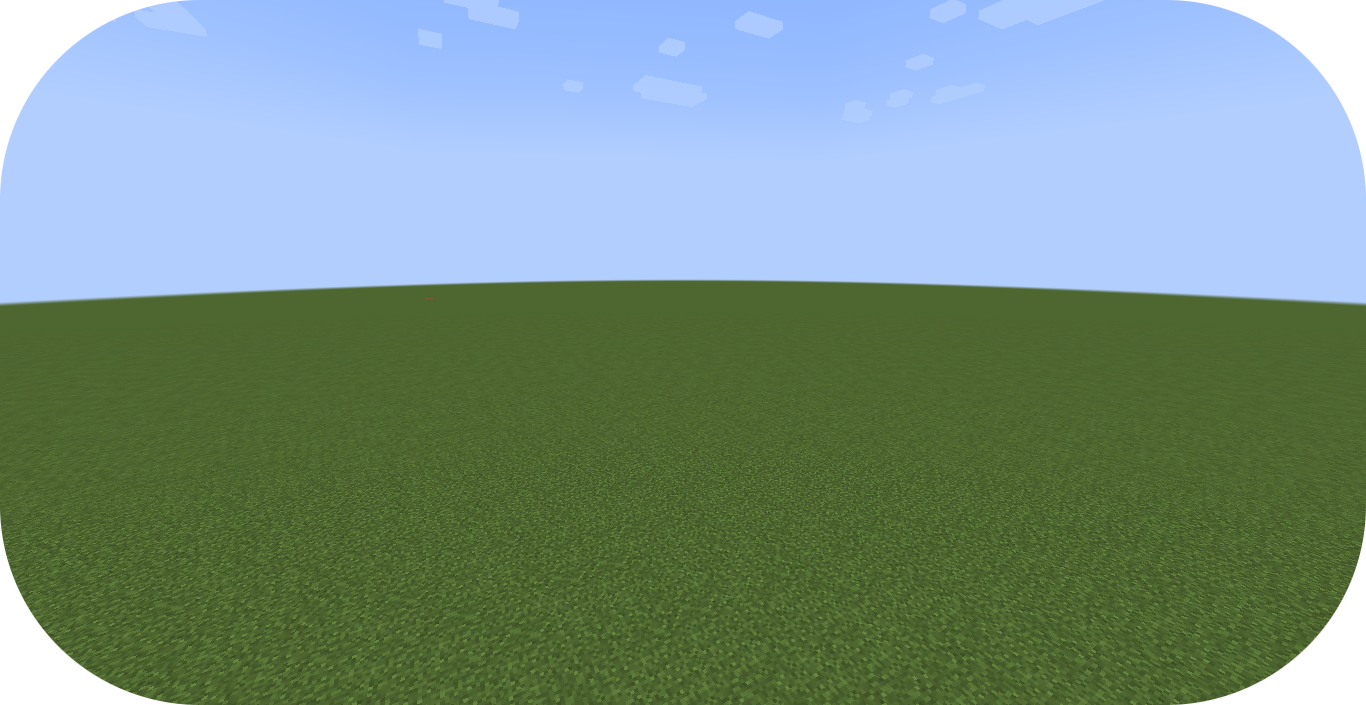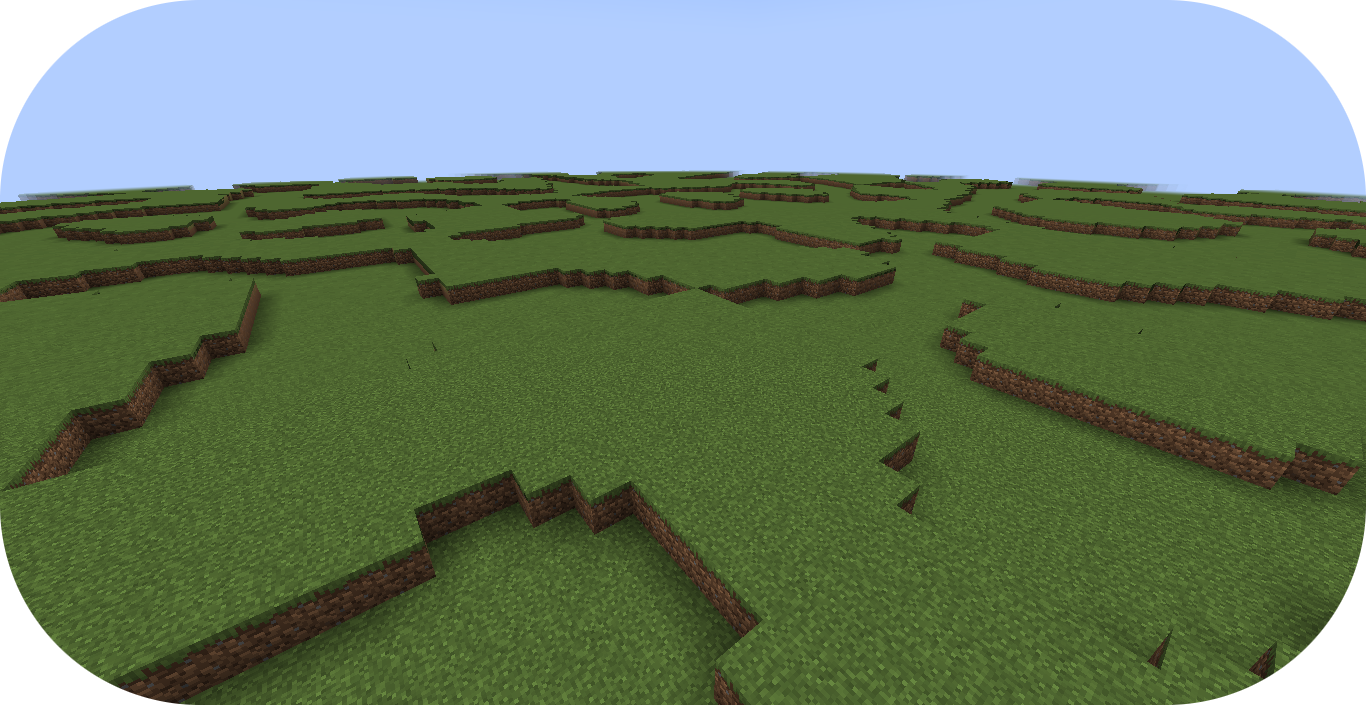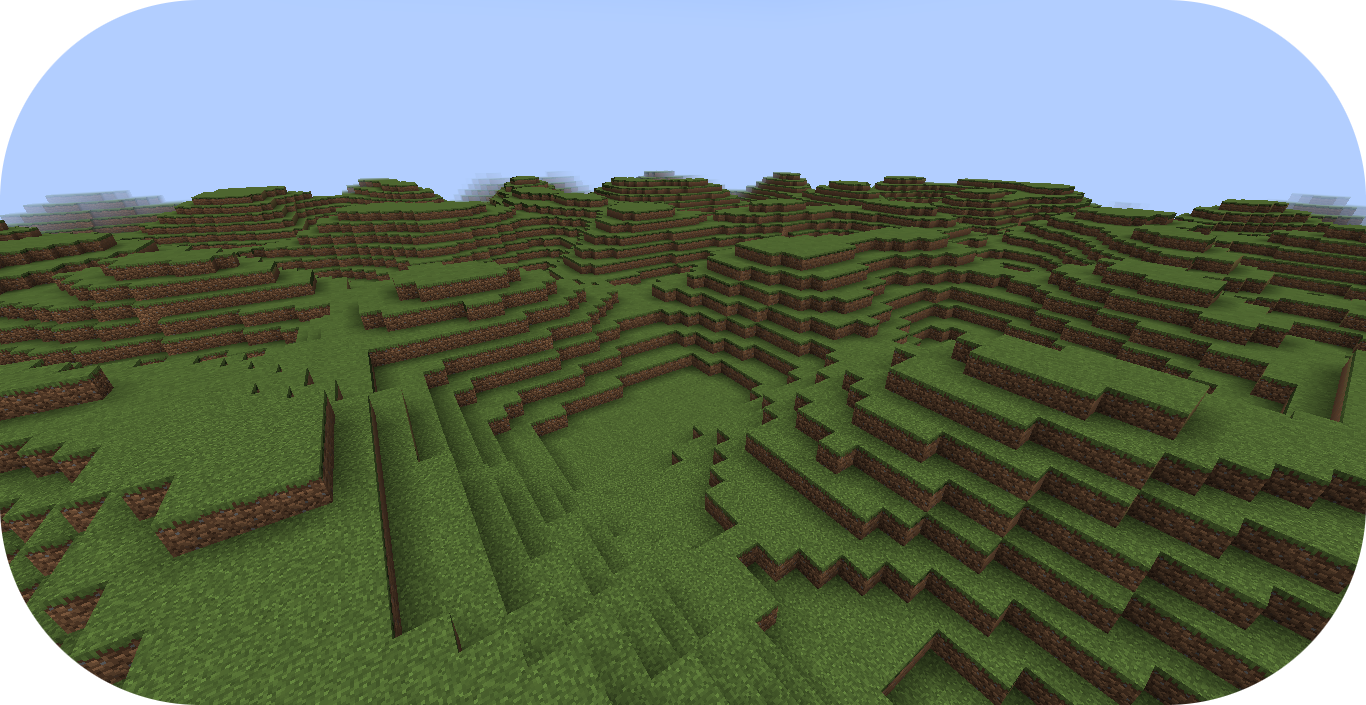Creating Terrain From Scratch¶
This guide will continue the process of creating a new Terra config pack from the beginning with creating terrain.
If you haven’t already, please read the Config Development Introduction & Creating A Pack From Scratch for more information before continuing.
If you’re stuck or need an example, you can find reference config packs for this guide on the GitHub repo.
Setting up New Terrain¶
PROCEDURE
Tip
Throughout this guide, the /packs reload command can be utilized to reload config packs and observe
changes live while in the world.
If Terra fails to reload after using /packs reload, then check the logs to troubleshoot the issue.
1. Add EXPRESSION sampler¶
The EXPRESSION noise sampler allows for
configuration of an expression for sampler output
with the capability of using functions in-built or user-defined along with other samplers within itself.
Open your FIRST_BIOME BIOME config in your editor of choice.
Add the highlighted lines below to replace the current terrain sampler with an EXPRESSION sampler.
1id: FIRST_BIOME
2type: BIOME
3
4vanilla: minecraft:plains
5
6terrain:
7 sampler:
8 type: EXPRESSION
9 dimensions: 3
10 expression: -y + 64
11
12...
terrain.sampler consists of the nested parameters type, dimensions, and expression.
type- Determines the noise sampler that will generate the terraindimensions- Determines the amount of dimensional coordinates (x, y, & z) for input samplingexpression- The expression configured by the user to create sampler output for terrain
Terrain generation is determined by whether the expression output is positive or negative.
Positive output results in solid terrain whereas negative output results in air.
The sampler expression -y + 64 just takes into account the
y-coordinate in particular for the moment.
The expression result will remain positive and generate terrain
till the y-coordinate in the world reaches 64 leading to the expression looking like -64 + 64 equaling
0, which isn’t positive meaning no terrain generation will occur here and beyond 64.
Y-coordinates greater than 64 will result in a negative output like -90 + 64 equaling -26 that will
result in no terrain.
The expression -y +64 results in perfectly flat terrain.

Note
Documentation of EXPRESSION and other noise samplers can be found here.
Documentation of mathematical expressions can be found here.
Tip
You can add variables for expressions to use to allow for easier configuration.
1terrain:
2 sampler:
3 type: EXPRESSION
4 dimensions: 3
5 variables:
6 base: 64
7 expression: -y + base
You can even reference anchored variables not directly attached to the sampler.
first_biome.yml¶1vars: &variables #variables anchored for samplers to use 2 base: 64 3 4terrain: 5 sampler: 6 type: EXPRESSION 7 dimensions: 3 8 variables: *variables #references previously anchored variables 9 expression: -y + base
2. Add sampler-2d¶
The expression -y + 64 results in perfectly flat terrain that
will be used as the base terrain in which we’ll apply noise to using
terrain.sampler-2d.
terrain.sampler-2d is recommended to configure alongside the terrain.sampler as it allows for easier
adding or subtracting from the base terrain especially with being in 2D, which doesn’t account for the y-coordinate.
terrain.sampler-2d may be less performant, but results in more detailed terrain with being full resolution rather
than interpolated.
Add the highlighted lines below to add the terrain.sampler-2d.
1id: FIRST_BIOME
2type: BIOME
3
4vanilla: minecraft:plains
5
6terrain:
7 sampler:
8 type: EXPRESSION
9 dimensions: 3
10 expression: -y + 64
11
12 sampler-2d:
13 type: EXPRESSION
14 dimensions: 2
15 expression:
16
17...
terrain.sampler-2d will consist of the same nested parameters type, dimensions, and expression.
As terrain.sampler-2d is 2D, it will have 2 dimensions rather than 3 dimensions.
3. Add sampler for use¶
terrain.sampler-2d will now require an expression to
influence the flat generation created by the terrain.sampler expression.
Either a cached noise sampler referenced through the pack
manifest or one provided within sampler-2d.samplers will be needed in order to use it within the
terrain.sampler-2d expression.
Add the highlighted lines below to provide a OPEN_SIMPLEX_2 noise sampler
for use in the expression.
1id: FIRST_BIOME
2type: BIOME
3
4vanilla: minecraft:plains
5
6terrain:
7 sampler:
8 type: EXPRESSION
9 dimensions: 3
10 expression: -y + 64
11
12 sampler-2d:
13 type: EXPRESSION
14 dimensions: 2
15 expression:
16 samplers:
17 simplex:
18 type: OPEN_SIMPLEX_2
19 dimensions: 2
20 frequency: 0.04
21
22...
sampler-2d.samplers consists of the noise samplers provided for use within the expression parameter.
Samplers are defined with a function name hand picked by the user with this case being simplex.
simplex will have to contain the parameters required for the
noise sampler, which are dimensions and frequency.
frequency is explained in detail here.
4. Apply sampler to expression¶
The simplex sampler can now be utilized within the terrain.sampler-2d expression.
Add the highlighted line to the expression line below to implement simplex into the terrain.
1id: FIRST_BIOME
2type: BIOME
3
4vanilla: minecraft:plains
5
6terrain:
7 sampler:
8 type: EXPRESSION
9 dimensions: 3
10 expression: -y + 64
11
12 sampler-2d:
13 type: EXPRESSION
14 dimensions: 2
15 expression: simplex(x, z)
16 samplers:
17 simplex:
18 type: OPEN_SIMPLEX_2
19 dimensions: 2
20 frequency: 0.04
21
22...
The terrain generates with 1 block elevation differences in response with simplex output.

5. Adjust sampler-2d expression¶
The sampler-2d expression can be adjusted in a multitude of different ways to help achieve the result you
terrain desire.
As the output range of OPEN_SIMPLEX_2 is [-1, 1], adding 1 to the simplex output within the expression
will lead to the output range always resulting positive. With that, terrain will only be added on top of the base
terrain without any subtraction as there is no possible negative output.
This is useful if you want terrain to be maintained above a certain y-level.
1terrain:
2 sampler:
3 type: EXPRESSION
4 dimensions: 3
5 expression: -y + 64
6
7 sampler-2d:
8 type: EXPRESSION
9 dimensions: 2
10 expression: simplex(x, z)+1
11 samplers:
12 simplex:
13 type: OPEN_SIMPLEX_2
14 dimensions: 2
15 frequency: 0.04
Multiplying simplex with a value within the expression will lead to more hilly terrain as the simplex output
gets increased along with expanding the range between the minimum and maximum output.
1terrain:
2 sampler:
3 type: EXPRESSION
4 dimensions: 3
5 expression: -y + 64
6
7 sampler-2d:
8 type: EXPRESSION
9 dimensions: 2
10 expression: (simplex(x, z)+1) * 4
11 samplers:
12 simplex:
13 type: OPEN_SIMPLEX_2
14 dimensions: 2
15 frequency: 0.04
Attention
Make sure you put the addition operation within parentheses to make sure it happens before the multiplication operation.
The terrain elevation has some variety to it now. You can adjust the multiply value by increasing it to have bigger hills and decreasing it for smaller hills.

Conclusion¶
This guide only covers the surface level capability in which you can configure terrain expressions.
There is limitless potential with more complex and intricate expressions that utilize various features such as built-in functions, user-defined functions, and multiple noise samplers to achieve terrain from that of simple landscapes to floating islands.
Reference configurations for this guide can be found on GitHub here.
Note
A useful tool for visually previewing your sampler configs is the Noise Tool that can be found and explained in more detail here.